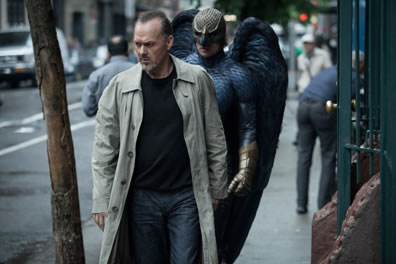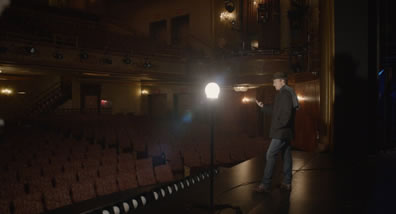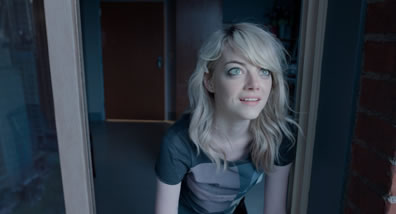Birdman and Shakespeare
A Life of Delusions Takes Flight

Riggan Thomson (Michael Keaton) walks down a New York City street with his alter ego, Birdman (a character he played in a series of superhero movies) in the film Birdman. Below, Edward Norton as Mike; bottom, Emma Stone as Sam, both, along with Keaton, nominated for acting Oscars. Photos from Fox Searchlight, IMDB.com.
William Shakespeare has made it to many Academy Award nights. His plays have been nominated seven times in the Best Picture category and won once. Actors playing his characters have earned 15 noms and a win. Shakespeare himself—or, at least, a representation of Shakespeare—took home the big prize in 1999. This year's Oscars include yet another representation of The Bard: A piece of Lego, who has one line ("Rubbish") and break dances across a street at one point. OK, The Lego Movie's one nomination—for best song—has nothing to do with Shakespeare, but his mere inclusion in the film illustrates his ongoing cool quotient.
On the other hand, Shakespeare himself—the genius I've personally encountered on stage, on film, in music, and in life—could very well dominate this year's Academy Awards. Birdman or (The Unexpected Virtue of Ignorance), which earned nine Oscar nominations, is imbued with Shakespearean genius as it profiles The Bard's world, both in its setting and in its portrayal of the human condition. It is a movie of Shakespeareances.
If you have not seen Birdman, do. Here's a litany of reasons why, aside from its nomination for best picture:
- It's a dramedy with a story (nominated for best original screenplay) that will keep you hooked to its confounding end;
- The bravura filmmaking brilliance of Alejandro G. Iñárritu (nominated for best director) who turns the movie into what seems to be a continuous tracking shot (the film also earned a nomination for cinematography);
- The performance of Michael Keaton (nominated for best actor) as Riggan Thomson, a fading movie star who once starred as the superhero Birdman in a series of blockbuster films and is now trying to make a comeback by writing, directing, and starring in a Broadway adaptation of the Raymond Carver short story, What We Talk about When We Talk about Love;
- The performance of Emma Stone (nominated for best supporting actress) as Keaton's daughter, Sam, who, like her father, is recovering from substance abuse;
- The performance of Edward Norton (nominated for best supporting actor) as Mike, an ultratalented but ultrainsecure and ultramanic stage actor;
- The performance of Naomi Watts as Lesley, Mike's girlfriend and an actress making her Broadway debut in Riggan's play;
- The performance of Zach Galifianakis as Jake, Riggan's exasperated agent trying to shepherd the play through one preview catastrophe after another leading up to opening night;
- The backstage humor and on-stage hijinks—especially if you love or are in the theater—that make up so much of the film;
- Shakespeare's sudden appearance in the play's soundtrack (nominated for both sound mixing and sound editing).
- And in that appearance by Shakespeare is evidence of how much Birdman plays on a theme Shakespeare himself returned to again and again and again over the course of his career. Indeed, I plan to include Birdman in my Shakespeare film library.
- While I won't reveal the end of Birdman here, I will be describing several scenes and elements of the movie, so I suggest you see the film before you read this to get the full effect of Iñárritu's craftsmanship on your psyche.
Let's start with that ending. All I will say about Birdman's last scene is that while some critics call it confounding, many viewers would describe it as one huge huh?!! As we were leaving the movie theater, Sarah asked me, “What do you make of that ending?” That, of course, launched me into philosophical musing, which set the stage for my Shakespearean musings here.
And to lay the groundwork for those musings, I would like to address a bit of cinema technique Iñárritu indulged in, not unlike two other great movies with shock endings: The Sixth Sense (directed by M. Night Shyamalan) and The Usual Suspects (directed by Bryan Singer). In all three movies, the endings come out of nowhere but are yet not arbitrary plot twists or cheap gotchas. They are achieved in large part because we watch all movies accepting the conventional rules of certain story-telling techniques. However, the directors of these films break those rules by, ironically, treating those film-making devices as absolute truths.
For The Usual Suspects, Singer turns the conventions of flashback storytelling inside out to the point that it becomes the gist of the plot itself, one we had no idea was unfolding right before our eyes. With the last scene of The Usual Suspects, not only do we realize the whole movie was not what it seemed, but that the fearsome criminal mastermind, Keyser Söze, has put one over on us as well as on all the other characters in the movie. In The Sixth Sense, Shyamalan turns the nature of film editing on its head. Film audiences accept that editing, like Shakespeare's scene changes, is used to move us through time and space in the telling of a story: things happen—unimportant things, generally—between scenes. But what if nothing at all happened between scenes? With the shocking reveal at the end of The Sixth Sense, we realize that all of what Dr. Malcolm Crowe has experienced over the course of the movie is exactly what we have seen him experience; nothing happened between the scenes we see him in, which explains why the door to his basement office is always locked.
With Birdman, Iñárritu is playing with perspective. With his brilliant tracking shots, perspective is one of the stars of Birdman—the way we walk down the cramped backstage hallways to the proscenium arch and move through doorways to the roof and fly across New York City. But for the most part, we are seeing life through the perspective of two characters: Riggan and Sam. Father and daughter have one other important thing in common: they are father and daughter. This is the substance to my theory explaining the movie's final scene—if you take that last scene literally.
Now, if that scene is metaphorical, it is the final point in a movie portraying ourselves.
 The perspective in this movie and often in Shakespeare blurs the lines of reality and imagination (or delusion, but let's try to give that word a bit of respect for the time being and not regard it as a negative condition). Iñárritu immediately fuzzies things in the movie's opening scene, as Riggan sits cross-legged and meditating—in mid-air. The character of Birdman turns out to be Riggan's alter-ego, and we see clear evidence that Riggan himself actually has super powers. Jake, of course, thinks he's crazy, and he's not the only one: Riggan himself combats his alter ego as if it were an alternate personality he needs to quash. Furthermore, as the movie transpires, we see key pieces of evidence that Riggan might be delusional, that his super powers are all in his mind. Does this all mean he will fall apart before opening night? Or will he turn these seeming delusions into the inspiration to succeed? These are the twisting plot threads we think we are following when Riggan does something totally unexpected—or seems to do one thing but it turns out he does something else—or seemed to do something else because we get an enigmatic piece of evidence telling us he didn't do that something else at all and then he does do something else—or seems to, and this is the final scene, cut to black, roll credits. Our own perspective is back where we started with Riggan floating as he meditates in his dressing room: did we just see what we think we saw?
The perspective in this movie and often in Shakespeare blurs the lines of reality and imagination (or delusion, but let's try to give that word a bit of respect for the time being and not regard it as a negative condition). Iñárritu immediately fuzzies things in the movie's opening scene, as Riggan sits cross-legged and meditating—in mid-air. The character of Birdman turns out to be Riggan's alter-ego, and we see clear evidence that Riggan himself actually has super powers. Jake, of course, thinks he's crazy, and he's not the only one: Riggan himself combats his alter ego as if it were an alternate personality he needs to quash. Furthermore, as the movie transpires, we see key pieces of evidence that Riggan might be delusional, that his super powers are all in his mind. Does this all mean he will fall apart before opening night? Or will he turn these seeming delusions into the inspiration to succeed? These are the twisting plot threads we think we are following when Riggan does something totally unexpected—or seems to do one thing but it turns out he does something else—or seemed to do something else because we get an enigmatic piece of evidence telling us he didn't do that something else at all and then he does do something else—or seems to, and this is the final scene, cut to black, roll credits. Our own perspective is back where we started with Riggan floating as he meditates in his dressing room: did we just see what we think we saw?
Aside from these moments of blurred reality, the movie is presented as starkly real. However, as I reflected on one scene in particular, I began to wonder. On each night of the play's preview run, something goes drastically wrong, usually due to Mike's onstage antics (being drunk on one night, getting excessively horny with his co-star on the next night). On the last preview night, Riggan, in his robe during a costume change, steps outside the stage door for a smoke and gets locked out, his robe stuck in the door. He can't get in, nor can he get his robe free, and Riggan ends up in just his underpants walking down the alley, out to the street, and around the block to get back into the theater through the front door, entering for his character's dramatic last scene through the audience, still in his underwear. As he makes his way through the crowded sidewalk, people recognize him as the Birdman star, and his underwear-clad stroll down Broadway becomes a You Tube and Twitter sensation.
It's interesting that in other scenes of Riggan walking the streets of New York, nobody recognizes him (and, no, the Birdman character did not wear an underwear suit, as Superman does). It's also an overlong trek along Broadway as tourists, costumed superheroes, Muppets, and even a marching band block his way. So, while this scene seems vividly real—well, what man hasn't had just such a nightmare, sans the underwear (do women have such nightmares, too?). Man, as a teen-ager I dreamed I was naked trying to get to school, in college trying to get to class, as a newspaper editor trying to make deadline in a newsroom, and recently trying to get to a theater in time for the play's start.
“We are such stuff as dreams are made on,” Prospero says in Shakespeare's The Tempest; “And our little life is rounded with a sleep.”
Time and time again, Shakespeare, an actor and theater shareholder as well as playwright, drew on the theater as a metaphorical device. In almost every play, he drops some theater-based allegory (he also was an avid gardener and the son of a glover and wool merchant, so flowers and commerce also served him as frequent go-to images). He goes a significant step further on occasion, turning theater into life, and vice versa. This penchant of his starts, in an obtuse way, with what I believe is his very first play, The Taming of the Shrew, which is actually a play within a play. The whole story of Petruchio taming Kate, and Lucentio with his servant, Tranio, scheming to win Bianca is all a product of theater presented to the drunk Warwickshire tinker Sly. It's part of an elaborate hoax to delude Sly into thinking he's really a lord. It's significant to this discussion that Shakespeare creates a world of people, places (it sometimes reads like an atlas of Italy), and plots that is nothing more than a theatrical projection of his personal world of people, places (Petruchio's house is an English country manor), and, perhaps, plots. It's also significant that this theater is part and parcel of a drunk man's delusions.
“All the world's a stage,” Jaques says in As You Like It, “and all the men and women merely players. They have their exits and their entrances, and one man in his time plays many parts, his acts being seven ages.” Shakespeare's second-most famous speech is carved into or painted onto a lot of theater porticos and walls, as if it somehow legitimizes or at least honors the theater. But Jaques isn't talking about the theater. He is describing life, prompted to it by Duke Senior, whose lines prefacing the famous speech are never carved into any edifices: “Thou see'st we are not all alone unhappy: This wide and universal theater presents more woeful pageants than the scene wherein we play in.”
If we exist in a “wide and universal theater,” then are our lives really nothing more than “a walking shadow” (i.e., a part in a play)? And what are we, really, but “a poor player that struts and frets his hour upon the stage and then is heard no more”? This line is straight out of Birdman.
I know, most of you recognize that as Macbeth's lament upon learning that his wife had died. Life, he concludes in that speech, “is a tale told by an idiot, full of sound and fury, signifying nothing.” In Birdman, this speech suddenly emerges in the cityscape soundtrack as Riggan aimlessly wanders around outside his theater on the eve of his play's opening night when everything seems to be falling apart for him. We first hear Macbeth's “Tomorrow and tomorrow and tomorrow” speech as if in voice-over, but then we come upon an actor outside the theater reciting it. He suddenly stops and asks Riggan if he is doing it right. Iñárritu is making a poignant point inserting this particular speech from Macbeth into this scene of Birdman, and might be commenting on his movie as a whole. Aside from being aesthetically apt, Macbeth's speech is thematically pertinent at this point in the movie. What is Riggan now but “a poor player that struts and frets his hour upon the stage and is heard no more”? What is his work, whether as the iconic Birdman or in staging his adaptation of What We Talk about When We Talk about Love but “a tale told by an idiot, full of sound and fury, signifying nothing”? And what is his life but “a walking shadow”?
By movie's end, we are wondering what of what we just watched is supposed to be real and what are Riggan's delusions. Or, is it Sam's delusions? Or both, perhaps? It could be ours. In Birdman, Iñárritu may not simply be presenting theater as an allegory for life; rather, life is theater, an illusion or, in fact, a delusion—our delusions.
 Shakespeare's career-long metaphorical arc of life as theater ends with his last solo composition, The Tempest. Again,we tend to focus uncontextually on the play's most famous passage—I even drew on it for a publicity brochure I designed for the Oklahoma Shakespeare Festival early in my journalism career. “We are such stuff as dreams are made on” sounds like the kind of slogan a career counselor would use to open his workshop, or a coach might use to exhort her team toward a championship, or as the poignant turn-about moment in a Disney movie.
Shakespeare's career-long metaphorical arc of life as theater ends with his last solo composition, The Tempest. Again,we tend to focus uncontextually on the play's most famous passage—I even drew on it for a publicity brochure I designed for the Oklahoma Shakespeare Festival early in my journalism career. “We are such stuff as dreams are made on” sounds like the kind of slogan a career counselor would use to open his workshop, or a coach might use to exhort her team toward a championship, or as the poignant turn-about moment in a Disney movie.
The line, however, is the conclusion of one of Shakespeare's most pessimistic of his existential speeches, leaving Hamlet's “To be or not to be” far in the dust. The magician Prospero has just conjured up for his daughter, Miranda, and future son-in-law, Ferdinand, a pageant blessing their betrothal, so when Prospero says the actors are “all spirits and are melted into thin air,” he's merely stating a fact. But he repeats the phrase, “into thin air,” and suddenly meanders into a comparison of his pageant with life itself: “And like the baseless fabric of this vision, the cloud-capped towers, the gorgeous palaces, the solemn temples, the great globe itself, yea, all which it inherit, shall dissolve, and, like this insubstantial pageant faded, leave not a rack behind.” Prospero seems to be describing the end of the world, but he also could be meditating on death—his or anybody's, for he then concludes with “We are such stuff as dreams are made on; and our little life is rounded with a sleep.” Life, then, is merely a vision, and the actors—ourselves—are all spirits that will melt into thin air.
Yet, this isn't The Tempest's most revealing speech. That honor I bestow on the epilogue, spoken by Prospero. He implores the audience to “set me free,” from the island to get back to his dukedom in Milan, traveling on “gentle breath of yours my sails must fill, or else my project fails, which was to please.” Many a commentator, literary critic, and theater practitioner have likened Prospero the magician to Shakespeare the playwright announcing his retirement from the theater; that is too pat. Shakespeare has done something much more marvelous here. This play is not only about illusions, it is about delusions, and as the play progresses, the characters are never sure what's reality and what's not. At times, neither are we: that shipwreck at the beginning seems real but, we are assured, is not (though we don't get proof until the last scene); and the banquet of food that the spirits present the noblemen looks like it's really there, but it may or may not be. And then at the end, Shakespeare has his lead character tell us that everything we just saw is a play, a pageant, an illusion. A delusion.
Such is Birdman. And such, perhaps, is life. If so, our ignorance would, indeed, be an unexpected virtue.
Eric Minton
February 20, 2015
Update
Birdman won four Oscars: Best Picture, Director, Screenplay, and Cinematography. February 23, 2015
Comment: e-mail editorial@shakespeareances.com
Start a discussion in the Bardroom



 Find additional Shakespeareances
Find additional Shakespeareances